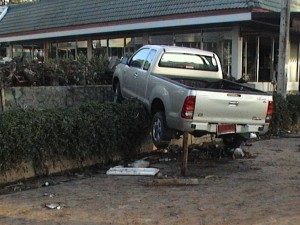 In 2004 I went to Phuket for Christmas with my wife and daughter. Everything was really good, up until Boxing Day.
In 2004 I went to Phuket for Christmas with my wife and daughter. Everything was really good, up until Boxing Day.
We were very lucky with the impact of the Tsunami, despite staying right by the beach the level of water inundation was less than we saw only a few kilometers further north. Even better we had a flight booked out to Bangkok on the 27th.
The general community of Phuket were not so lucky, they had to stay and deal with the massive impact of the event. This photo I took after the water subsided can perhaps be seen as humorous. But it is likely that a local family depended on the use of this vehicle (and tourists to create demand) for their livelihood.
I was thinking about this over the past day or two as there has been a lot of reporting of the anniversary of the event on the TV.
The local community had not prepared for such an event nor had something like this happened to them before. Somehow they found a means to cope, rebuild and move on. They had a sense of community, and some aspects of resilience emerged as a response to this event.
It is not surprising that a lot of the leading thinking about resilient communities is being developed in New Zealand. They live with the daily risk of earthquakes – and in some parts of the country they are a regular occurrence. I have previously posted about the work of NZ Resilience Trust. They introduce a concept called “Civil Resilience”.
Essentially they are working from the view that resilience is an emergent property of an entitity/community. As such it is difficult to detect and measure before an event occurs that requires resilience to be demonstrated. They identify a number of attributes of resilience, and seek to create an environment in which these attributes can be nurtured.
Civil Resilience is about establishing ownership of the initiatives by the community, empowering citizens to act immediately in their own interests (rather than wait for instructions from some central authority) and to establish communication and networking of individuals and organisations within the community.
It seems to me these are concepts that need to be included in enterprise approaches to achieving resilience.
- We all live in communities and the staff we are going to rely on in a crisis live in those same communities.
- Do we really expect our people to leave their families and friends in distress and report to work to help the company recover?
- Would you do it yourself?
- We deliver services in communities – supply chains and integrated outsourcing arrangements.
- These arrangements are going to be more interdependent in the next decade
- Often we are part of a “Data Centre Community” – without knowing it.
- See lessons learned from the Buncefield incident in UK as an example of potential impacts of this
“Communities of resilience”, has a nice ring – worth exploring further.
Self-reliance and sustainability are two of the conditions that are required to become and remain resilient in the NZ Resilience Trust approach. Also applicable to the enterprise and to local operations within a bigger enterprise.
Do you take account of any community approaches in your BC/Resilience strategies and plans?
Do you know where your Data Centres are located, and the threats and capabilities in those communities?
Thanks for the timely post, Ken. I recently did a review of a research article on the Thai emergency preparedness following the Tsunami (you may have read it:http://www.husdal.com/2009/11/24/emergency-logistics-and-risk-mitigation/). Your thoughts reflect the conclusion of the article, that true resilience is something that must be built within and by the community itself, bottom-up, NOT top-down with some fancy contingency plan, thought out by some government agencies.
Jan, you must stop writing new content so I can read your back-catalog. I have a note to read that post but have not gotten to it yet.
Glad to see we are working form the same page with the community aspect.
Ken, I'm actually closer to fulfilling your wish than I want to be…
I'm in the finishing stages of a book chapter that has to be submitted on Dec 31st, and after that I really need a break, so probably there won't be anything new until Jan 4th.